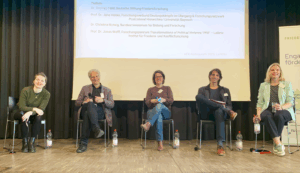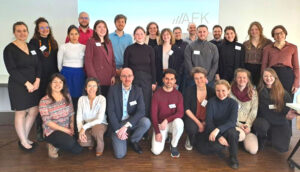AFK Colloquium and AFK Junior Researchers' Conference 2025 in Landau
By Josias Bruderer.¹ The annual AFK Colloquium (AFK: Working Group for Peace and Conflict Research) took place in Landau on March 20th 2025, accompanied by the AFK Junior Researchers’ Conference (Junge AFK) on March 18th-19th 2025.
Science Policy Panel Discussion at the AFK Colloquium

Peace and Conflict Studies amidst “Zeitenwende” (turning point): Which research, how funded, how communicated?
Representatives from science and research-funding discussed the future of peace and conflict research. The event was organised in cooperation with the networks Conflicts.Meanings.Transitions, TraCe and VesPoTec, which are funded by the Federal Ministry of Education and Research (BMBF) in the funding line ‘Strengthening Peace and Conflict Research’.
Dr. Thomas Held (Deutsche Stiftung Friedensforschung), Prof. Dr. Jana Hönke (Universität Bayreuth), Dr. Christina Norwig (BMBF) und Prof. Dr. Jonas Wolff (PRIF) spoke on the panel. The discussion was moderated by Madita Standke-Erdmann (King’s College London/PRIF).
All panelists agreed that peace and conflict research is indispensable, especially in times of crisis. At the same time, it needs structural and long-term support in order to remain effective. Further noteworthy points were:
- flexibility to react to political developments through thematically broad structural funding (Wolff, PRIF)
- peace research must always be more than just security policy (Hönke, UBT)
- limits of project-based funding logic, emphasising the importance of long-term positions and secure infrastructures (Held, DSF)
- funding line that aims to facilitate interdisciplinary networking, internationalization and sustainable structures (Norwig, BMBF)
The panel showed that strong, diverse and publicly present peace and conflict research needs political backing – and structural reliability.
AFK Junior Researchers’ Conference

VeSPoTec members and speakers of Junge AFK Linda Ostermann and Julian Schäfer have succesfully organised the AFK Junior Researchers’ Conference 2025, generously funded by Deutsche Stiftung Friedensforschung. It’s aim is to foster networking among young researchers in the field of peace and conflict research. The conference provided them with the opportunity to present and discuss their own research in a safe and supportive environment, gaining initial conference experience. It was primarily aimed at students and doctoral candidates who are actively engaged in peace and conflict research.
Given the positive response, six thematic panels were put together, each with 3-4 contributions, which, in keeping with the broad thematic aspirations, had quite different orientations and comprehensively represented various interests in peace and conflict research.
Panel 1: „Navigating Power Dynamics: Cybersecurity, Arms Trade, and Dual-Use Challenges”
- „How to systematically study science-policy interactions in arms control: a conceptual and methodological advance” by Maximilian Tkocz (PRIF)
- „Small States, Big Influence? Rethinking Power Dynamics in the European Union’s Arms Trade Network Amidst Russian Threats – Insights from Social Network Analysis and Relational Power Concepts“ by Tamim Karadamur (Universität Leipzig)
- „The Gendered Logics of International Cybersecurity – How Masculinities Shape the UN OEWG on ICTs” by Clara Perras (PRIF)
- „The Problem of Dual-Use: An Analysis of German Chemical Weapons Exports Restrictions“ by Lucas Tillessen (Universität Duisburg-Essen)
Further information on the individual contributions can be found in the conference report.
Panel 2: „Complex Peace: Security and Legal Challenges in Post-Conflict Societies“
- „Disarmed, demobilized, and at risk? Security Challenges in the Collective Reintegration Process of former FARC-EP combatants in Colombia“ by Laura Camila Barrios Sabogal (PRIF)
- „Peace through non-violent conflict? An Agonistic Analysis of Disarmament, Demobilisation, and Reintegration of the FARC-EP in the Colombian Peace Agreement“ by Ines Meyer (European Commission)
- „Evolution of Counterinsurgency Strategies in Turkey and Colombia after the end of their respective peace processes from 2016 to the present“ by Evelyn Gonzalez Guevara (Leipzig University)
- „Civil society organisations and customary authority: navigating land reform in Sierra Leone“ by Christopher Rohles (RPTU)
Further information on the individual contributions can be found in the conference report.
Panel 3: „Wind, War, and Policy: The Intersection of Climate Emergency and Conflict Research“
- „The Climate Emergency: A hidden factor impacting Peace and Conflict Research“ by Myriel Mathez (UNDP/ Linneaus University)
- „Wind in the trees. Conflicts around the expansion of wind energy in forests in Saxony-Anhalt, Germany“ by Majbrit Hüttenhein (Otto-von-Guericke-Universität Magdeburg)
- “Rebels as Disaster Managers – A case study of climate-related disaster management by the Taliban in Afghanistan“ by Hannah Wagner und Abdullah Ammar (Philipps-Universität Marburg)
- „Feminist development policy in the field of climate and water resource management in Central Asia“ by Katinka Lorenzen (Freie Universität Berlin / Potsdam Institut für Klimafolgenforschung)
Further information on the individual contributions can be found in the conference report.
Panel 4: „ Weapons of Persuasion: The Power of Framing in Defense and Politics”
- „’We create the indispensable basis for peace, freedom, and sustainable development: security’ – A Framing Analysis of German Arms Manufacturer Rheinmetall” by Greta Middendorf (Humboldt-Universität Berlin)
- „Killing the Other – Social Distance and the Legitimization of Civilian Victimization in Armed Conflict” by Katharina Storch (Fernuniversität Hagen)
- „Strategic framing as a cause for January 6th– twittering an insurrection?“ by Janina Wysocki and Paul O’Brien (Universität Passau / Universität Ljubljana)
- „Changes in the Military Procurement Policy of Turkey under the Justice and Development Party” by Evelyn Gonzalez Guevara (Leipzig University)
Further information on the individual contributions can be found in the conference report.
Panel 5: „Interwoven Realities: Geopolitical Shifts and Civil Society Cooperation“
- „Transnational Civil Society Networks in Post-Soviet Europe: The impact of Geopolitical Upheaval and Regional Disparities on Relational Dynamics“ by Malin Nissen (Leipzig University)
- „Social Reconciliation in Exile. How exiled Colombians rebuild relationships through creative bodily experiences“ by Catherine Sophia Castellanos Montenegro (Philipps-Universität Marburg)
- „The Development of German-Russian Civil Society Cooperation: Qualitative Analyses in View of Russia’s Aggression Against Ukraine Since 2014“ by Malin Nissen (Leipzig University)
- „Warum wir Krieg neu denken müssen“ by Henry Seidel (RWTH Aachen)
Further information on the individual contributions can be found in the conference report.
Panel 6: „Bodies, Rights, and Ideologies: Exploring Social Conflicts and Power Dynamics“
- „Zum Verbot der Kinderarbeit zwischen demokratischer Teilhabe von Kindern und Ausbeutung. Anhand des Beispiels einer gewerkschaftsähnlichen Organisation in Bogotá“ by Yuri Natali Tarache Piñeros (Alpen-Adria Universität Klagenfurt)
- „Antisemitischer Antifeminismus in der Wochenzeitung Junge Freiheit“ by Foelke Bockelmann (Philipps-Universität Marburg)
- „Körper als Erfahrung“ by Mascha Liening (Universität Bielefeld)
Further information on the individual contributions can be found in the conference report.
Alisa Rieth (Bundeskanzler-Helmut-Schmidt-Stiftung) introduced the Escape Game „Unlock Europe – Das Escape Game zu Frieden und Sicherheit in Europa“, developed in cooperation with IFSH. This was followed by a speech by PD Dr. Hendrik Hegemann (IFSH) about social peace, political conflicts and authoritarian populism, forming the basis for a concluding discussion about the concept of defensive democracy.
Reflecting on the conference, participants reported positive networking opportunities and found the conference helpful for their future careers and studies. Julian Schäfer and Linda Ostermann were also pleased that interest in further involvement with peace and conflict studies had been sparked, promising good future developments for the field.
¹ Parts of this article originate from TraCe (→ news) and Junge AFK (→ conference report).
